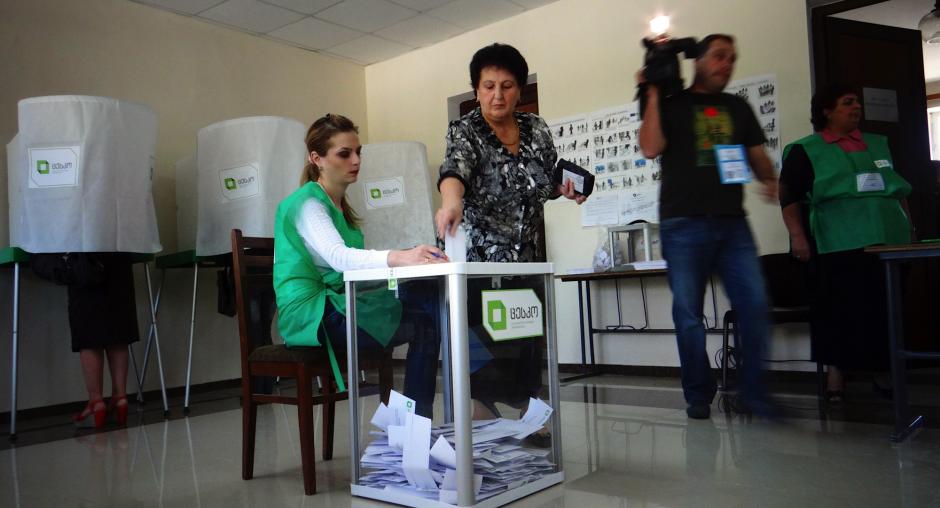Georgia takes important step in consolidating conduct of democratic elections, but some key issues remain, election observers say

TBILISI, 2 October 2012 – Georgia’s parliamentary elections marked an important step in consolidating the conduct of democratic elections, although certain key issues remain to be addressed, concluded the international election observers in a statement released today.
The elections were competitive, with active citizen participation through the campaign, but the campaign environment was polarized and tense, with some instances of violence. The campaign often centered on the advantages of incumbency, on one hand, and private financial assets on the other, rather than on concrete political platforms and programmes.
While freedoms of association, assembly and expression were respected overall, instances of harassment and intimidation of party activists and supporters negatively affected the campaign environment, and often ended with detentions and fines of mostly opposition-affiliated campaigners. This contributed to an atmosphere of distrust among contestants, the statement said.
The election administration enjoyed a high level of confidence and the Central Election Commission operated transparently, holding frequent open meetings open to observers, party representatives and media.
Election day was calm and peaceful throughout the country, and international observers assessed all stages of the election day process overall positively, although some procedural shortcomings were noted. The Central Election commission began releasing preliminary results early in the morning hours, contributing to the transparency of the process.
“Despite a very polarizing campaign that included harsh rhetoric and shortcomings, the Georgian people have freely expressed their will at the ballot box,” said Tonino Picula, the Special Co-ordinator who led the short-term OSCE observer mission, and the Head of the OSCE Parliamentary Assembly delegation. “The process has shown a healthy respect for fundamental freedoms at the heart of democratic elections, and we expect the final count will reflect the choice of the voters.”
“Despite shortcomings, these elections were very competitive,” said Luca Volontè, the Head of the Parliamentary Assembly of the Council of Europe (PACE) delegation. “The political forces elected to the new Parliament, both in the majority and opposition, should now take up their responsibilities and work together to address these shortcomings for the further democratic development of the country. PACE will continue to co-operate actively with all forces in the new Parliament in these important reforms.”
“Yesterday we witnessed Georgians’ profound engagement in the democratic process,” said Assen Agov, Head of the Delegation from the NATO Parliamentary Assembly “We were impressed that the mass rallies were peaceful, and the heartfelt involvement we saw can only bode well for Georgia’s future.”
“Georgia is an important partner for the EU, and we continue to be a steadfast supporter of promoting democracy and reform in Georgia,” said Milan Cabrnoch, the Head of the European Parliament delegation. “This will be possible if those who have been elected, in power or in opposition, exercise their democratic privileges responsibly in continuing reform for the benefit of the Georgian people.”
“Yesterday’s elections highlight the role that key democratic institutions play when they act professionally and impartially,” said Nikolai Vulchanov, the Head of the OSCE Office for Democratic Institutions and Human Rights (ODIHR) long-term election observation mission. “Elements of the legal framework, however, should still be improved and ODIHR and the Council of Europe stand ready to continue their productive co-operation with the Georgian authorities on this front.”
For further information contact:
Neil Simon, OSCE PA, +995 599 240 582 or +45 60 10 83 30, neil@oscepa.dk
Thomas Rymer, OSCE/ODIHR, +995 577 664 410 or +48 609 522 266, thomas.rymer@odihr.pl
Nathalie Bargellini, PACE, +995 555 114 643 or +33 6 65 40 32 82, nathalie.bargellini@coe.int
Marta Udina, EP, +995 577 329 350, or +32 498 983 339, marta.udina@europarl.europa.eu
Valérie Geffroy, NATO PA, +995 577 329 354, or +32 478 554 816, vgeffroy@nato-pa.int
